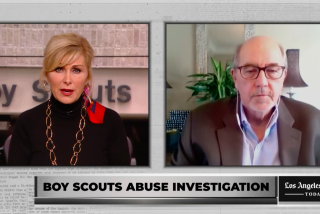Andrew Kohut dies at 73; one of nation’s leading pollsters
One of this nation’s leading public opinion pollsters, Andrew Kohut was a frequent presence in print and on television and radio, especially during election seasons.
But when he was in college in the mid-1960s, Kohut was studying sociology and hadn’t given a thought to polling as a profession. Then suddenly he needed a job.
“My wife and I were having a baby,” he said in a 2008 interview with the Washington Examiner, “and we didn’t have health insurance.”
He got work at the Gallup Organization and never looked back.
“People speculate about the nature of how people think about things, about their behaviors. And when I found out, boy, you could measure it? That was fascinating to me.”
Kohut, 73, who was the director of the Times Mirror Center for the People & the Press in the 1990s and a founding director of the nonpartisan Pew Research Center, died Tuesday at John Hopkins Hospital in Baltimore.
The cause was chronic lymphocytic leukemia, said his wife, Diane Colasanto.
In one of his best-known polls of recent years, he found that little divides people in this country more than whether they are Democrats or Republicans.
“What’s happened is that we have much broader differences by party affiliation than by any of the things that typically describe public opinion,” he said in a 2012 interview on National Public Radio. “The income gaps, the education gaps, the religious gaps, they’re all the same as they were 25 years ago.”
Not just looking at the numbers, but placing them in a historical and human context were hallmarks of Kohut’s work.
“Public opinion was something precious to Andy,” Michael Dimock, president of Pew Research Center, said in a statement posted to the organization’s site.
“In an era when many numbers, including polling, have become increasingly automated and commodified, Andy always reminded us that the ‘public’ in public opinion is not an indiscriminate force. It is people,” Dimock said.
Kohut believed polling gave voice to the masses who weren’t pundits on television or couldn’t afford to buy an ad.
Polling “doesn’t give just the loud voices’ say…about how things are going. Or doesn’t give experts — so called experts — the notion that they know what public opinion is,” he said in a 2007 interview with the Big Think website.
He was born Sept. 2, 1942, in Newark, N.J. He graduated with a bachelor of arts degree from Seton Hall University.
He was attending graduate school at Rutgers University when he dropped out to join Gallup. He rose through the ranks, becoming president of the company from 1979 to 1989.
Kohut then founded Princeton Survey Research Associates and the next year became the founding director of surveys for the Times Mirror Center. In 1993, he was named director of the center.
With Times Mirror Corp., which then owned the Los Angeles Times and other newspapers, going through cutbacks in the mid-1990s, the Pew center took over the operation.
Kohut was director of the Pew Research Center from 2004 until he stepped down in 2012.
He had an admirable record in calling elections, often getting voting percentages correct within a margin of error. His biggest blunder, by far, came in 1988 when he was president of the Gallup poll and called for candidate Robert Dole to win the New Hampshire presidential primary by 8% on the Republican side. Instead, then-Vice President George W. Bush won by 9%.
“I was dismayed,” Kohut told the Washington Post.
He didn’t shy away from problems in polling when he found them. “He basically called it like it was,” Columbia University political science professor Robert Shapiro said in an interview Tuesday.
“He raised the kind of questions that survey researchers needed to consider.”
That was the case 20 years after his New Hampshire mistake. He didn’t do a poll on the state’s 2008 primary race, but other major pollsters predicted that then-Sen. Barack Obama would win the Democrat side, probably by a comfortable margin. But Hillary Rodham Clinton was the victor.
Kohut looked for answers.
“Poorer, less-well-educated white people refuse surveys more often than affluent, better-educated whites,” he wrote in a New York Times opinion piece. Less-affluent white voters were more likely to vote for Clinton over Obama, he pointed out. Pollsters, he said, had to find a way to get those voters to respond to questions in greater numbers.
Unlike pollsters aligned with political parties, Kohut strove to be nonpartisan. It was a lesson he learned from his first boss in the field, George Gallup.
Gallup was “completely flummoxed by people who accused him of being, you know, a Republican or a Democrat,” Kohut said in the Big Think interview. “What Gallup wanted was to get ... the damn poll right.”
In addition to his wife, Kohut is survived by his daughter Amy, son Matthew, stepson Nicholas Cohn; sister Rosellen Cutter; and one grandchild.
david.colker@latimes.com
More to Read
Start your day right
Sign up for Essential California for the L.A. Times biggest news, features and recommendations in your inbox six days a week.
You may occasionally receive promotional content from the Los Angeles Times.







